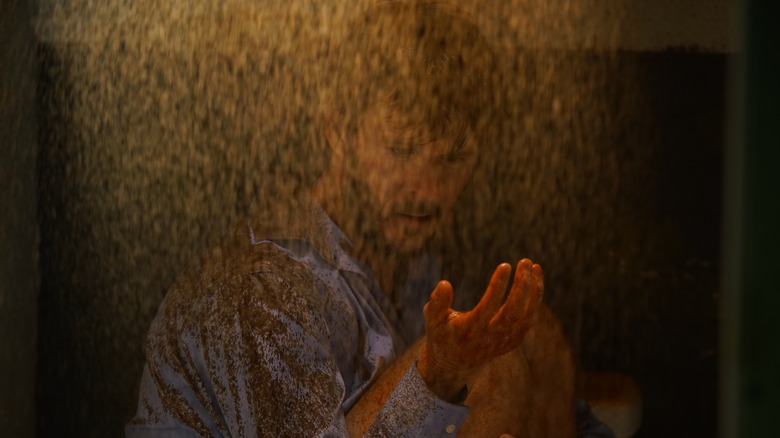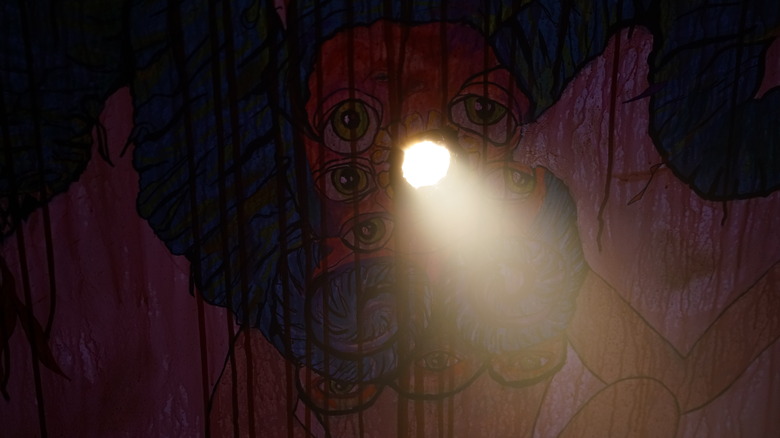Glorious Review: A Hole In The World
- The cast is great
- The story keeps surprising you
- The visuals make a rest-stop men's room look stunning
- The third act could have used a little more time and exploration, but that makes it no less rewarding
Locked room stories are always a gamble; the smaller the room (and the cast), the bigger the gamble. Do it right, and you get a compelling film that crackles with immediacy. Blow it, and you get a slog.
The trick to getting it right, at least from a viewer's perspective, is performing the tightrope walk of balancing the emotional concerns of the characters in that room with the essential plot dilemma that has them stuck in there in the first place. You've done your job if you can service both of those story needs throughout the film. Even better if you can do it while merging the two into a single thematic thread. And if you can do it while also throwing crazy, eye-popping genre flourishes into the story, you've done something special.
"Glorious," the new horror film from director Rebekah McKendry, is one of those special movies, a locked-room descent into Lovecraftian madness that's both darkly funny and surprisingly profound. Driven by two winning lead performances, some stomach-churning visuals, and a script that's as witty as it is unexpected, it's a film that delivers beautifully on its far-out premise, and then just keeps going until the emotional arc is as satisfying as the narrative arc.
Down in a hole
The locked room of "Glorious" is a men's room at a rundown rest stop somewhere on the side of a lonesome highway. Wes (Ryan Kwanten) is driving down that particular highway after a rough breakup, his car stuffed with possessions, his mind crawling with thoughts of how and where everything went wrong for him. The rest stop seems like the perfect place to take a little pause, maybe have a drink or two, and try and recover a little of what he lost.
But one drink turns into more-or-less a whole bottle, and by the next morning, a hungover Wes is sprinting for the men's room. But this isn't just any men's room. Something's lurking in the stall next door, its energy radiating out from what looks like a glory hole in the wall, something that claims to be a god (voiced by J.K. Simmons), and further claims that if the world is going to survive the days to come, it needs Wes' help. Is this his chance to fix everything he did wrong, or is he about to become a pointless sacrifice in a cosmic game older than time itself?
The meat of "Glorious" is, as the trailer suggests, the conversations between Wes and the god, which begin with Wes simply not believing what he's experiencing while the god explains, in Simmons' soothing tones, what's really going on here. This could have been an exercise in pure, plodding exposition, or a rote checklist of various logical concerns viewers themselves might have as they watch the film. But the script, by Joshua Hull and David Ian McKendry, never lets these conversations grow stale. Sometimes the staleness is avoided by Wes attempting excursions out of the magically locked bathroom, but the refreshing quality of these scenes largely comes through in the dialogue, which feels real despite the surreal nature of the conversations. There's a really precise, well-considered merging of the gritty and the profound in the words, and it helps the whole film land better, particularly in the first act as things get established.
That same blend of gritty and profound is also evident from the very beginning in the film's visual style. McKendry, who rose to prominence as a horror academic and commentator before making features herself, is a lifelong student of horror imagery, and that means that "Glorious" is dripping with well-realized shots. Whether we see a strange, primordial writhing of something just under the stall wall or we're just looking at a sick man crouched beside a toilet, there's a real depth of vocabulary that McKendry brings to the framing, pacing, and general character of each scene, and that makes "Glorious" compelling even in its most grounded moments.
Man vs. god
Because of the tightly focused nature of the story, Kwanten and Simmons are tasked with taking all of these beautiful visuals and clever words and shouldering them with a particular sense of commitment. After all, this is a movie about a man who discovers a god lurking on the other side of a glory hole, so you've got to find actors who are not only game for that concept, but capable of selling it to an audience who might expect a film that never grows beyond its conceptual hook. Kwanten, who for much of the film is the only face we see onscreen, rises to this challenge with a depth of commitment that makes the movie crackle. In some moments he's in a survival thriller, in others a mounting crescendo of cosmic horror, and his face adjusts to each with a rawness and an openness that adds depth to the film. Simmons, who never gets to appear onscreen, imbues the god with his own rawness, a sense of tragicomic urgency that helps propel the film forward in its earliest stages, and adds to the power of its later frames.
Those later frames are best not spoiled here, of course, but the third act is where "Glorious" transforms from a very entertaining genre film to truly special horror cinema. That highwire act of balancing the film's emotional needs with its narrative ones merges — through the performances, through the script, and through McKendry's direction — into something grander, a meditation on life and the universe that's both unsettling and deeply thoughtful. After an hour spent nervously laughing at the film, we spend the last half hour watching with awestruck wonder as the endgame of "Glorious" delivers moments and ideas that will stay in your heads for days after watching it. It's a turn that's both surprising and somehow entirely consistent with the film's gloriously funny, gloriously sick vision of a man doing an emotional and intellectual battle with a god, and it helps make "Glorious" unlike anything else you're likely to see this year.
"Glorious" premieres on Shudder on Thursday, August 18.


